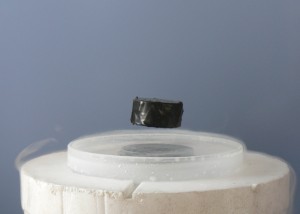Posts Tagged ‘condensed matter physics’
Iron-Based Superconductor Breakthroughs
Research from Cornell University confirms the theory about how electrons pair up and move through the superconductor without interference. You can read the original article here. The way electrons move through the superconductor is, of course, key to the way the superconductor allows a current to pass without resistance.
The development of a room temperature superconductor is one of the Holy Grails of condensed matter physics. Until 1986, it was believed that superconductivity was limited to temperatures below 30 degrees Kelvin (-243 degrees Celsius). Thanks to work at IBM, we’ve since seen the development of high-temperature superconductors (don’t get too excited – the “high temperature” gets up to -163 degrees Celsius). Any research that helps us to understand how superconductors work will lead us closer to the development of superconductors that do not require extraordinary conditions to function.
Why are we interested in superconductors anyway? Well, superficially it’s because of phenomena like this:
That’s not a magic trick, folks – it’s a magnet levitating over a superconductor. If you haven’t seen this before, I’m afraid you’re way behind the times. We’re already using superconductors all over the place. They’re the most powerful electromagnets we know about, and can be found in MRIs and particle accelerators, for instance. Maybe you heard that the Large Hadron Collider at CERN has to be cooled to near-absolute zero temperatures to function. Well, that’s because the cold temperatures are required to keep the LHC’s superconductors working as required.
I’m not so interested in superconductors for particle accelerators, though. Rather, it’s what they could do for our power grid and trains that has my attention. Practically everything to do with the transmission of power will be revolutionized by superconductivity, because there would be no (or close to no) inefficiency in the system. Right now, a lot of energy is lost en-route and dispelled in the form of heat. In fact, if you have anything electrical that generates heat when that’s not part of its function, you know that’s all wasted energy. Superconductors will help to cut down on that waste.
I’ve had a love of trains ever since I was a kid, and it saddens me to see the rest of the world progressing in locomotive technology while we remain in a nineteenth century stasis. I hope that breakthroughs in superconductivity will eventually help to snap us out of that, and make upgrading the nation’s rail systems a profitable endeavor.
So, there’s a lot riding on experiments like this one done at Cornell.
